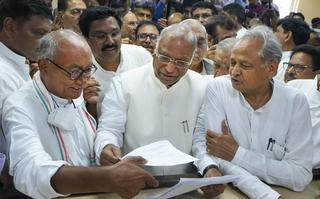No family man
The Congress is on the right-track, but the Gandhis must not play favourites in the contest
A contest for its top post, a rare event for any political party in India, has turned the spotlight on the Congress. Around 8,000 delegates will vote on October 17 to elect a new chief for the party. It was the refusal of Rahul Gandhi to return to hold the formal reins of the party that set the ball rolling in this direction. Mr. Gandhi also made it clear that his mother Sonia Gandhi could not continue as president, and his sister Priyanka Gandhi Vadra cannot contest. Leaving the road clear for a relatively open contest for the top post which is reserved for a member of the Nehru-Gandhi family whenever one of them claimed it, Mr. Gandhi set out on a walk from the southern tip of the country towards the north. His Bharat Jodo Yatra has also struck a chord with people in the areas it has touched so far. Mrs. Gandhi had wanted Rajasthan Chief Minister Ashok Gehlot to contest, and he appeared to be agreeable, initially. But the efforts to effect a transition in the State ended in chaos, grounding the plans for his candidacy. MLAs in Rajasthan want Mr. Gehlot to continue in office. The Rajasthan episode was badly managed by the party, showing itself and a loyal veteran in a bad light. It was avoidable.
The contest is actually for the second most important position in the Congress. It is clear that Mr. Gandhi will remain the final authority in the party, while the elected president will be tasked with the running of the organisation. The BJP has had supreme leaders above party presidents — A.B. Vajpayee and L.K. Advani at one point and Narendra Modi and Amit Shah now. There is a valid perception that the family is tilting the scales in favour of one contestant — Mallikarjun Kharge — against Shashi Tharoor, which needs to be dispelled. The Nehru-Gandhi family’s moral authority over the party stems from its neutrality and fairness in internal tussles. That authority is often exercised through representatives who at times fail to maintain neutrality. Recent episodes in Punjab and Rajasthan — the promotion of Navjot Singh Sidhu and the pressure on Mr. Gehlot, respectively — have weakened the authority of the family. Being a neutral arbiter is the right thing to do, and apart from that, self-preservation demands that Mr. Gandhi enables popular leaders to emerge stronger in the party. Mr. Kharge or Mr. Tharoor, the truly popular should be able to win. Mr. Gandhi will only reinforce his authority by making it public that the family has no candidate.
(Source: The Hindu, it is meant for educational purposes only)

-
Exercise (verb) – use, employ, make use of, utilize
प्रयोग करना
-
Task (with) (verb) – Assign a piece of work to.
कार्य सौंपना
-
Reinforce (verb) – strengthen, enhance, fortify, increase, bolster
मजबूत करना
-
Transition (noun) – change, move, passage, transformation, conversion
परिवर्तन
-
Chaos (noun) – disorder, disarray, disorganization, confusion
अव्यवस्था
-
Stem from (phrasal verb) – arise from, originate from, spring from, derive from
से उत्पन्न होना
-
Contest (noun) – A competition for a political position.
प्रतियोगिता
-
Episode (noun) – Incident, Affair, Chapter, Event, Occurrence, Experience
घटना
-
Set out (phrasal verb) – start, make a start, start out, begin one's journey
प्रस्थान करना
-
Refusal (noun) – denial, rejection, rebuff, repudiation, negation
इनकार
-
Episode (noun) – incident, event, happening, occurrence, affair
प्रकरण, घटना
-
Weaken (verb) – undermine, diminish, lessen, reduce, impair
कमजोर होना
-
On the right track (phrase) – following a course that is likely to result in success.
सही रास्ते पर
-
Play favorites (phrase) – show favouritism towards someone or something.
-
Turn the spotlight on (phrase) – To focus on or bring attention to someone or something.
पर ध्यान केंद्रित करना
-
Delegate (noun) – representative, envoy, ambassador, deputy, emissary
प्रतिनिधि
-
hold the reins (phrase) – to be in control
बागडोर संभालना
-
Set the ball rolling (phrase) – begin/continue an activity, discussion, etc
आरंभ करना
-
Strike a chord (phrase) – Create an emotional response
के साथ जुड़ाव होना
-
So far (phrase) – hitherto, as yet, heretofore, previously, thus far
अब तक
-
Effect (verb) – Implement, make happen, bring about, create
कार्यान्वित करना
-
Ground (verb) – to have a reason, cause, or argument for your actions or beliefs
कारण होना
-
Candidacy (noun) – Application, candidature
उम्मीदवारी
-
In office (phrase) – (of a government) in power
-
Veteran (noun) – Expert, old-time, past master, Experienced person
अनुभवी
-
In a bad light (phrase) – to make someone seem to be a bad person
गलत तरीके से दिखाना
-
Running (noun) – Management, administration, operation, controlling, overseeing
जिम्मा
-
Valid (adjective) – Logical, suitable, rational, sound, compelling
जायज़, वैध
-
Perception (noun) – View, opinion, picture, assessment, insight
धारणा
-
Tilt the scales (phrase) – To change the balance of a situation, such that one side or element is favored or gains advantage.
के पक्ष में झुकाव होना
-
Dispel (verb) – Dismiss, disperse; to cause to disappear
दूर करना
-
Neutrality (noun) – Impartiality, detachment, non-involvement, a neutral stance
तटस्थता
-
Fairness (noun) – Equality, impartiality, even-handedness
निष्पक्षता
-
Tussle (noun) – struggle, fight, scuffle, brawl, battle
खींचतान
-
At times (phrase) – Sometimes, once in a while, every so often
कभी कभी
-
Arbiter (noun) – umpire, judge, arbitrator, adjudicator, referee
मध्यस्थ
-
Self-preservation (noun) – the act of protecting yourself in a dangerous or difficult situation, usually as a basic instinct
कठिन परिस्थितियों में स्वयं की रक्षा या चोट से ख़ुद को बचाना
-
Make public (phrase) – Make known, publicize, reveal, announce, put out
सार्वजनिक करना